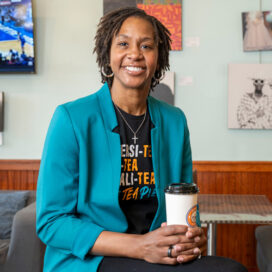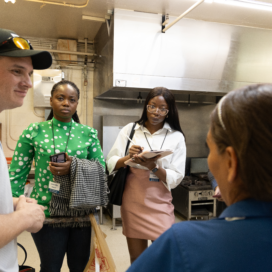When you provide opportunity
Published: September 29, 2022 / Author: Tracy Graham
On April 1, 2022, the Mendoza College of Business hosted an award ceremony for its inaugural Diversity, Equity and Inclusion Grow the Good in Business Case Competition. The case competition asked specialized masters students to develop and present solutions to the wealth gap in Indiana.
The event featured keynote speaker Tracy Graham (BBA ‘95) who shared his own story of challenges and triumph that led him to Mendoza. His words inspired case competition participants and audience members alike by highlighting why supporting diverse and inclusive perspectives is essential for creating equity.
I speak to you today with a great sense of gratitude and also with humility. I am grateful for the opportunity to share my story, yet humbled by the magnificent work that the students have put into making a difference in diversity, equity and inclusion. I am inspired to hear the proposed solutions to address the wealth gap in our communities. I know all too well the barriers that most poor and minority children face in all the facets of life. Yet, I also understand the pivotal moments and actions which can help to transform those lives.
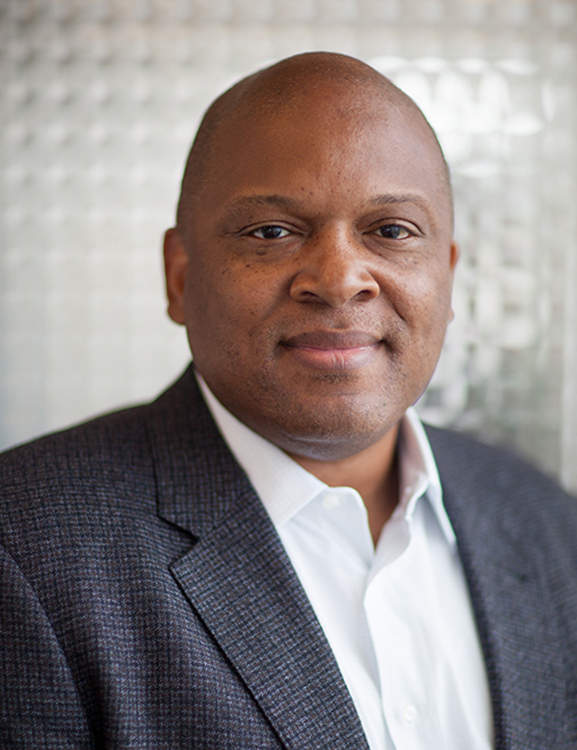
Tracy Graham
You see, I am the son of a single mother, who never finished eighth grade, and a father whom I’ve never met. My mother had her first child at 15 years old. By 23, she had me, her fourth and last child. I grew up in Englewood, on the south side of Chicago. A neighborhood engulfed by poverty and violence. It was the kind of neighborhood where graduating from high school was often celebrated, but not expected. Where shootings were more common than studying. And drugs more common than degrees.
But even though I was in an environment that systematically crushed spirits and fostered hopelessness, I knew from an early age that I wanted more. So despite the tremendous peer pressure, my mother and I decided that I would not attend the underperforming public high schools available to kids from Englewood. Instead, I applied to St. Rita High School, a Catholic school in the heart of the city of Chicago. At this point, I had no idea how much this decision would shape the rest of my life. But I had a hunch that attending St. Rita might put me in a better position to be successful.
My hunch was right.
St. Rita gave me a scholarship and there I excelled both academically and athletically. I began to play football and after some success, earned a scholarship to play for Lou Holtz here at Notre Dame. When I arrived at Notre Dame, my only aspiration was to become a professional football player. I had no thoughts of a business career and didn’t associate success with any non-sports-related figures. I certainly didn’t know of any successful business leaders. All I had to look to was football. And there were football success stories on TV every weekend.
But Notre Dame opened my eyes to a whole other kind of success. The students in my classes came from a world that I had never been exposed to, from some of America’s most successful families.
At first, I felt like an outsider. Not just because I’m Black, but because financially I was different. During my freshman year, I dealt with staggering self-doubt, and wondering if I belonged at Notre Dame. Thankfully, I was fortunate enough to be surrounded by a community of professors, directors, coaches and other friends who lifted me up and made me believe that I did belong. I am forever grateful to them.
Notre Dame transformed the way I thought about myself and my future. And while I’m not sure that I appreciated it, looking back, it seems like every day the Notre Dame experience was teaching us about faith, life, business, hard work and values. Lessons that reach far beyond football. We spent far more time preparing for the game of life than games against Michigan or USC. The environment at Notre Dame fostered a sense of unlimited possibilities and slowly my expectations for my life began to change. I started to believe that football was not my only shot at success, and that I could be successful without ever making another tackle.
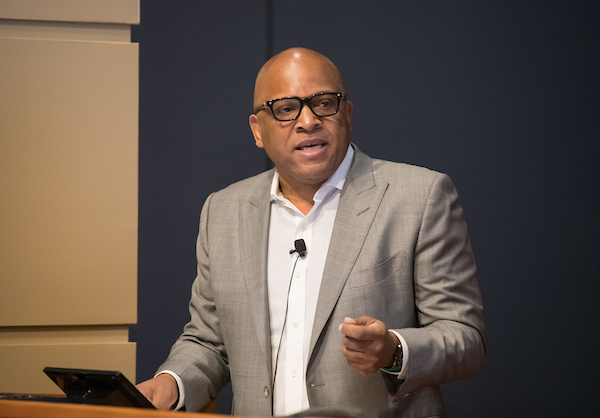
Stacy Graham (Steve Toepp / University of Notre Dame)
Notre Dame instilled in me a burning desire to be great; a commitment to building something bigger than myself from Notre Dame and Lou Holtz. I learned that success was possible. Even for kids like me, as long as I followed the fundamental principles of a life well lived. Principles like “do right,” “do the best you can,” “treat others as you’d like to be treated.” These are principles learned from Lou Holtz, but that I teach my own kids and carry with me every day, in life and in business.
So shortly after graduation, I founded my first company with a loan from one of my closest friends, Jerome Bettis, who many of you know is on campus now, getting his degree at 50 years old. He was a Notre Dame teammate, one of my closest friends.
The first customer that trusted our company was Mike Leep, from Gurley Leep Automotive here locally, a Notre Dame friend and grandparent. In 1997, in need of additional capital, I received a bank loan from 1st Source Bank, whose chairman and CEO was Chris Murphy, a Notre Dame alum and a gold sponsor of this event here today. Later that same year, Jay Jordan, whom this auditorium is named after, invested in me and helped me grow our business to become the largest privately held internet service provider in the country. We sold that business in 1999.
In 2000, Jay and I began investing in a new business data setup and after growing the business, we sold it in 2007 to Cincinnati Bell for my second business exit. I remember the day that money was wired into my account. All I could think about was where I came from.
I thought back to Christmas in Chicago in 1988. I was just 15 years old. Times were harder than usual. My mother had just been laid off from work. My 16-year-old sister had just given birth to a baby boy. And my entire family was living in a house heated by a kerosene heater in one room. I replay that memory over and over again in my mind. The memory became so clear that it felt like I was right there, instantly putting myself in that neighborhood. After some time, the reality of my new life began to sink in and it was nearly impossible to grasp how far we had come since that cold December day.
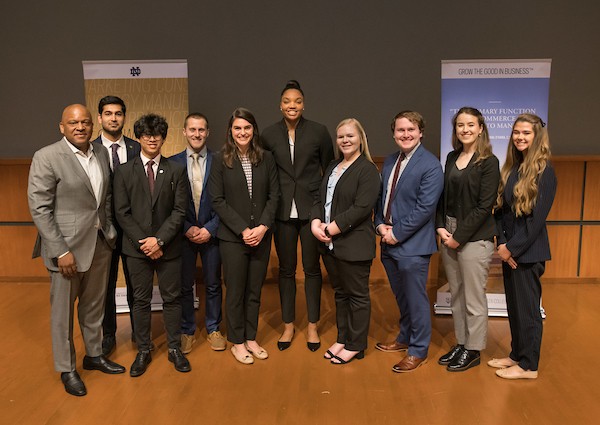
(Steve Toepp / University of Notre Dame)
I share my story with you with the hope that you will recognize in me an example of the potential of giving minorities the opportunity to prove their value.
The power of mentorship, support, access to transform the lives of people that have the desire and the will to work hard but lack the means, and this is a job for all of us. We must do all that we can to break down the social barriers that stifle inclusion and opportunity for minorities and women to achieve lasting equity and inclusion in the business community.
We must not lean into man’s instinct to do what is in their self-interest. We must prove that diversity and inclusion is not only the right thing to do, but that it creates tremendous business value.
Only then will stories like mine become not only be possible, but probable.
And when we do this, when we build and strengthen a robust Diversity, Equity and Inclusion platform, when we convince businesses of the perspective and value that minorities bring to their companies, when we make that an unparalleled experience, that is the American dream available to all people regardless of financial status or race. We will be enabling the Mendoza experience, the Notre Dame experience and the American experience to unleash the potential of a young man standing on a street corner on the south side of Chicago. When we refocus his energy and give him the tools and guidance that inspire him to be innovative and entrepreneurial, then we will have changed his life and made our community expand. We will have transformed a once lost individual into a person dedicated to being a force for good in the world.
Thank you for listening and Go Irish.

